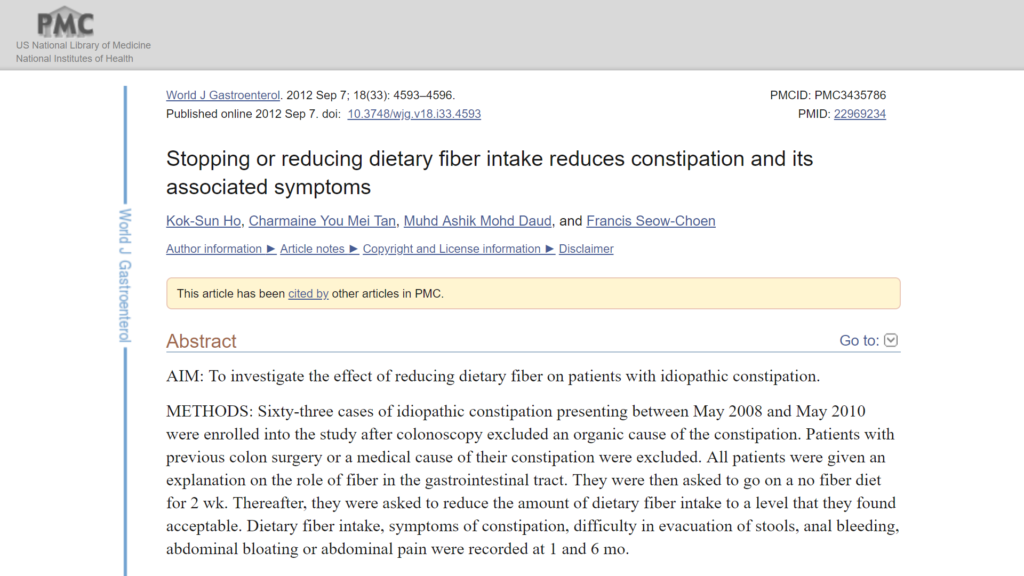Reducing Dietary Fiber Intake Can Improve Constipation
Dietary fiber can either help or harm your gut. A recent study found that reducing dietary fiber actually improved constipation, which is a somewhat surprising finding. Let’s discuss this study, what it means and how you can determine your ideal dietary fiber intake.
Study: Stopping or reducing dietary fiber intake reduces constipation and its associated symptoms
- 63 cases of idiopathic constipation
- At 6 mo, 41 patients remained on a no fiber diet, 16 on a reduced fiber diet, and 6 resumed their high fiber diet for religious or personal reasons.
- Patients who stopped or reduced dietary fiber had significant improvement in their symptoms while those who continued on a high fiber diet had no change.
- CONCLUSION: Idiopathic constipation and its associated symptoms can be effectively reduced by stopping or even lowering the intake of dietary fiber.
- Notes:
- Fiber + gut health – a double-edged sword
Healthy Gut, Healthy You walks you through a simple process to find the right balance for you
Download this Episode (right click link and ‘Save As’)
Dr. Michael Ruscio, DC: Hey, this is Dr. Ruscio. Let’s talk about dietary fiber. Now, if you’ve been keeping your ear to the ground in healthcare, especially digestive health, you’ve likely heard that fiber is very important for your gut health. And that statement is probably a bit of an over-extrapolation from what the research shows. But fiber can be helpful.
DrMR: However, many things, especially as they pertain to gut health, are very individual, meaning a given recommendation will work for some, and it may actually be detrimental or at least not work for others. And so it’s very important to have an understanding of these simple nuances so you can look at a recommendation and say, “Okay, here is how I can figure out if I should or should not do this.”
So dietary fiber, the background has been fairly well documented to be able to improve constipation. So in those who are constipated, increasing or supplementing with dietary fiber has fairly compelling evidence showing the ability to reduce constipation. However, this is not an absolute. And one of the things that you see with a higher fiber intake can actually be a provocation of some of the symptoms you see associated with irritable bowel syndrome: increased bloating, increased gas, increased abdominal distension or abdominal pain, and loose stools in some cases.
And as the study I’m about to share with you documents, in some cases, ironically, fiber can actually make constipation worse. So, again, while the general or broad body of literature seems to suggest that increasing one’s fiber intake can help with constipation, there’s some evidence showing it may actually make constipation worse. So let’s cover this study and then wrap up with how you can navigate this nuance.

The title of the study—I’ll put the abstract up here on the screen—“Stopping or reducing dietary fiber intake reduces constipation and its associated symptoms.” So the study continues here, a few quotes: “63 cases of idiopathic constipation,” this means constipation that didn’t have any other cause, one of the main, I guess you could say, causes or subtypes of constipation is IBS-constipation. So this is when you have constipation associated with altered bowel function, which can be constipation or diarrhea, and also abdominal pain, and sometimes bloating. So when you see this constellation of abdominal symptoms along with constipation, the cause of constipation might be the IBS, the irritable bowel. However, you have another subset who just has constipation. And that’s what this study was looking at. But these results, I think, apply to either subgroup.
So they looked at a 6-month intervention where patients either went on an essentially no—meaning a very low fiber diet—a reduced fiber diet, or kept their fiber consumption the same. And what they found, to quote here, “Patients who stopped or reduced dietary fiber had significant improvements in their symptoms while those who continued on the high-fiber diet had no change.” And continuing, “At 6 months, 41 patients of this 63 remained on a no-fiber diet.” So obviously it’s working for the majority. “And 16 patients on a reduced-fiber diet, and 6 resumed their high-fiber diet for religious or personal reasons.”
So in conclusion, “Idiopathic constipation—that means constipation that has no known cause—and its associated symptoms can be effectively reduced by stopping or even lowering the intake of dietary fiber.”
So what does this mean? Well, fiber and gut health is really a double-edged sword.
Sponsored Resources
We’ve discussed previously that your mouth is the first section of your gut. So in order to have a healthy gut, you have to have a healthy mouth. That’s why I like Quip’s Electric Toothbrush, which is ADA approved. That’s the American Dental Association.
Quip provides an effective, two-minute cleaning with vibrations and guiding pulses that will alert you to when to switch sides. The timed guiding pulses combined with the soft bristles help prevent overbrushing, which can be a serious contributing factor to gum disease. And I can personally say that this has helped me.
What I like about Quip also is that their electric toothbrush starts at $25, which is much cheaper than most electric toothbrushes. If you go to GetQuip.com/RuscioPodcast, you’ll get your first refill pack free when you purchase a Quip Electric Toothbrush. That’s your first refill pack free at GetQuip.com/RuscioPodcast.
Now, I think there has been a misinterpretation of data or the misreading of the science and led to an erroneous extrapolation from that data to make many health gurus and doctors and clinicians conclude that we all need a high-fiber diet in order to be healthy. That does not seem to be true. And this study helps document that. Fiber can be helpful for some, but it can also be detrimental for others. And it’s important that we don’t fall into this absolutist type of thinking that it’s either all good or all bad.
Now, what do you do about that? Well, in Healthy Gut, Healthy You, I lay out some simple steps that you can take to determine what your fiber intake should be. It’s actually not that challenging. But you need a roadmap to walk you through the appropriate sequence of steps to determine this. And I also in Healthy Gut, Healthy You, detail the literature on fiber as it pertains to overall health, risk of colon cancer, cardiovascular disease, other cardiovascular incidences, diabetes, obesity, and so on.
And what the data clearly shows is there’s no consistent benefit from fiber. Some studies show benefit. But an equivalent number of studies really show no improvement at all. So we really shouldn’t be saying that you need a higher fiber diet for your gut health.
And this is actually a common problem. I just got off the phone yesterday with a friend of mine who is a very well-known doctor in the health space who was a real health enthusiast. And after we had a discussion months ago, he kind of revised his diet. And he said, “Boy, this is the first time I haven’t had these loose stools that have been plaguing me for a while after cutting back on my dietary fiber intake slightly.”
So it’s important that we don’t, again, fall into this thinking that, “Fiber is always good. You need a high-fiber diet,” or, “Fiber is always bad.” Rather, there’s a simple sequence of steps you can take to determine what you should be aiming for in terms of your fiber intake. And it’s actually quite simple. You start on a lower fiber diet, and then slowly titrate up to find where you feel best.
Now, if you have other symptoms and imbalances in the gut, that can murky the process a little bit. And that’s where I’ll refer you to the map or the Great in 8 plan that’s contained in my book Healthy Gut, Healthy You. But the take-home here is that fiber and your gut health is not a one-size-fits-all recommendation. Some do better on higher. Some do better on lower. So make sure to do some experimentation, and listen to your body and take your body’s signals as the barometer for if you’re doing the right thing or if you’re doing the wrong thing. This is Dr. Ruscio and I hope this information helps you get healthy and get back to your life. Thanks.





Discussion
I care about answering your questions and sharing my knowledge with you. Leave a comment or connect with me on social media asking any health question you may have and I just might incorporate it into our next listener questions podcast episode just for you!